“All Our Yesterdays”
Written by Jean Lisette Aroeste
Directed by Marvin Chomsky
Season 3, Episode 23
Production episode 60043-78
Original air date: March 14, 1969
Stardate: 5943.7
Captain’s log. The Enterprise has come to Sarpeidon, an inhabited planet with a thriving civilization that is in orbit of Beta Niobe. That sun is going nova in three hours, but there is no sign of life on Sarpeidon, nor any indication that the planet had space travel capability.
Kirk, Spock, and McCoy beam down to the one spot on the planet that still has a power source. They find a library, as well as a librarian, Mr. Atoz, who is surprised to see them, having thought that everyone left. There are several versions of Atoz floating around the place, and eventually the landing party figures out what happened. They constructed a device called the Atavachron, which allows you to go to Sarpeidon’s past. Each individual on the world chose an era of the past to go to in order to keep them safe from the nova.
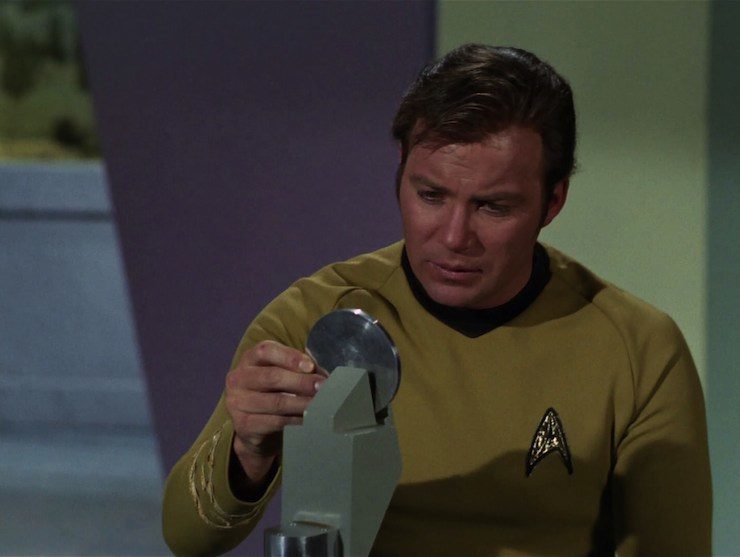
Atoz gives Kirk a disc that portrays a particular time period, and McCoy grabs another with Spock alongside him. While Kirk is watching his, he hears a woman scream from a doorway—which turns out to be the Atavachron’s portal. He runs through to find himself on the street he was observing, where several men are tormenting a woman with swords. Kirk defends her honor, defeating one of the men in a duel of swords.
McCoy and Spock run after Kirk, but they wind up in the frozen wasteland that McCoy was observing on his disc from Sarpeidon’s ice age five thousand years ago.
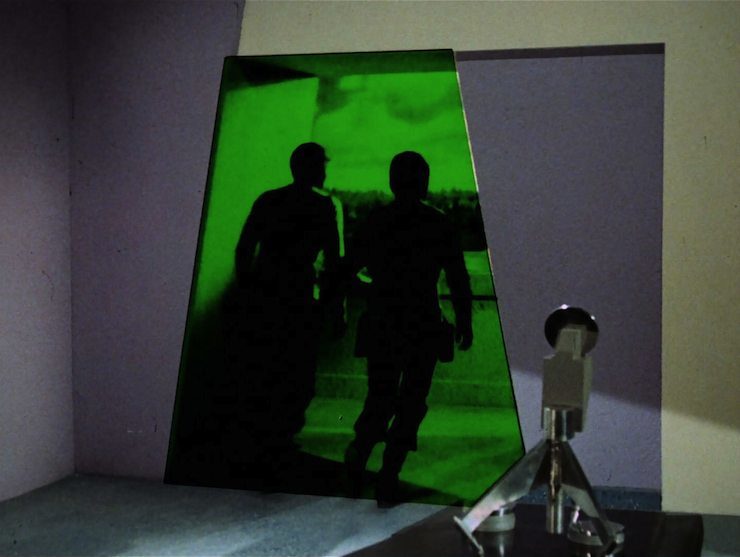
In both cases, there’s no sign of the portal they came through. The three of them can talk to each other near where they came through—which causes the woman Kirk rescued to think he’s talking to spirits—but soon Kirk is taken away by the constabulary, and Spock and McCoy are forced to find shelter.
The latter are rescued by a woman named Zarabeth, who lives in a nearby cave—and in the nick of time, as McCoy is suffering badly from the cold. Spock tucks him in furs, and then converses with Zarabeth. She’s a prisoner—apparently the Atavachron was originally used as a method of punishment during the reign of a tyrant—and at first she thinks she’s going mad, as the notion of an alien from another world like Spock is the stuff of fiction. But Spock convinces her that this is real.
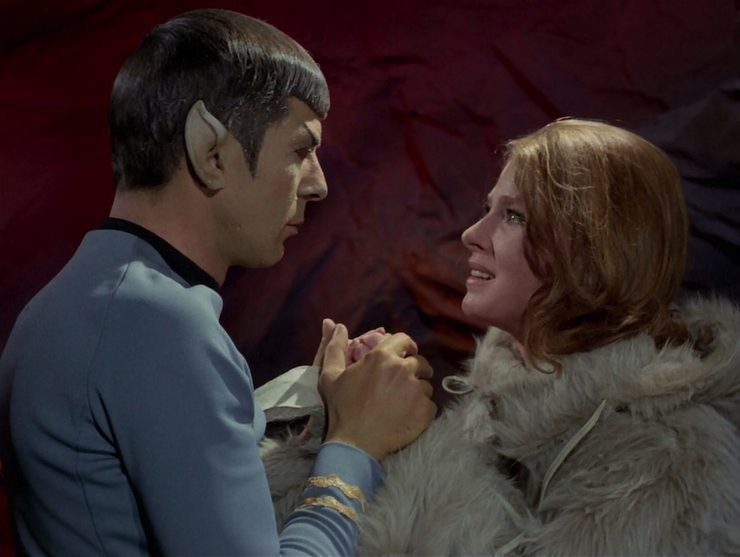
Kirk is interrogated in a prison. The woman he rescued and the constable accuse him of witchcraft, of talking to spirits, but the magistrate has a flicker of recognition when Kirk mentions the library. But after a moment, he denies knowing of the library or Atoz, and joins in the condemnation of Kirk as a witch.
Spock is having trouble organizing his thoughts. Zarabeth also explains that the Atavachron alters one’s cellular structure to the time period to which one travels. Once you go through, you can’t go back.
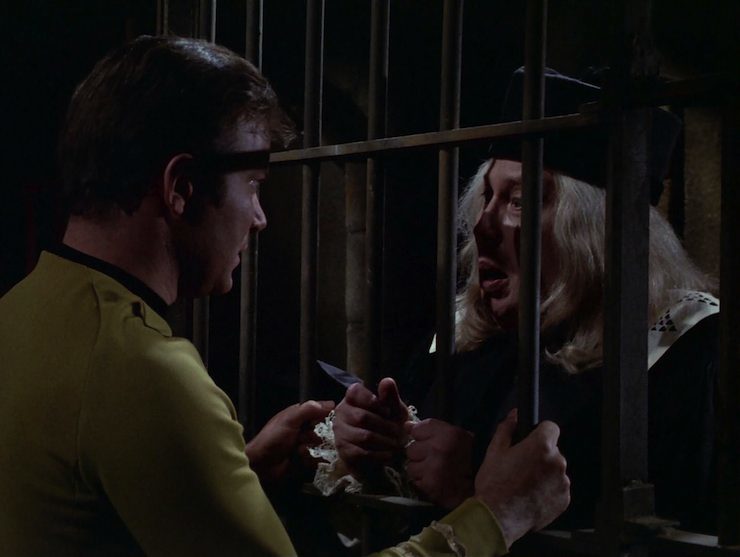
Kirk once again speaks to the magistrate, trying to get him to admit that he is from Sarpeidon’s future, also. Eventually, the magistrate gives in, but he has the same sob story as Zarabeth: returning to the future means instant death. But the magistrate says that you go through preparation, and Atoz did, in fact, say that he hadn’t had a chance to prepare them. The magistrate panics—without being prepared, you can only survive a few hours in the past—and takes Kirk back to the alley where he came through.
McCoy is slowly recovering, and he’s appalled to realize that Spock has done nothing to re-locate the portal. Spock rather obnoxiously points out that there’s nothing to be done and they’re stuck there in Sarpeidon’s past. When McCoy responds with his usual crotchetiness, Spock responds with very unusual anger.
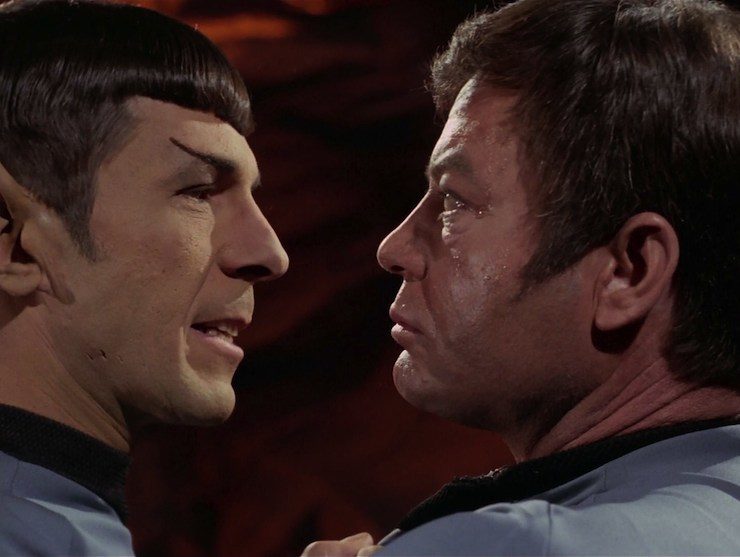
Kirk is able to get through to the library, thanks to the magistrate’s help. He contacts Scotty and tells him to prepare to warp away, and then tries to find the disc McCoy and Spock were viewing. The Atoz replicas try to “help” Kirk by preparing him, but the captain subdues them—however, the real Atoz is able to stun Kirk.
Spock and Zarabeth talk of being alone. The only food available is meat. Reluctantly, Spock eats some until he can contrive to construct a greenhouse. After realizing he’s enjoying the food and he’s flirting with Zarabeth, Spock finally figures out what McCoy figured out ages ago: he’s acting weird. But after a minute, he decides he doesn’t care, because he really wants to smooch Zarabeth.
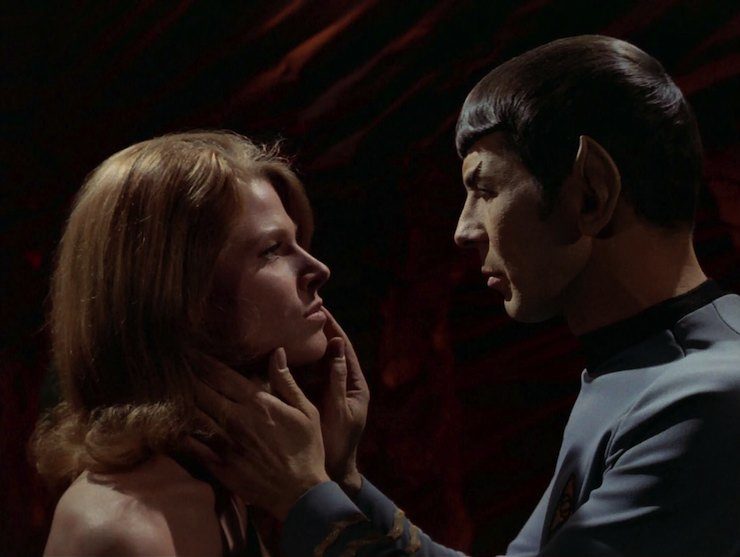
Kirk wakes up before Atoz can send him through the Atavachron and puts him in a headlock. Atoz finally agrees to help him look for Spock and McCoy.
McCoy walks in on Spock and Zarabeth’s morning after and goads Spock into attacking him, which makes Spock realize the truth—which McCoy also figured out ages ago—that he’s acting like a Vulcan from 5000 years ago, when Vulcans were savage and mean and nasty and stuff, before Surak brought them the ways of logic.
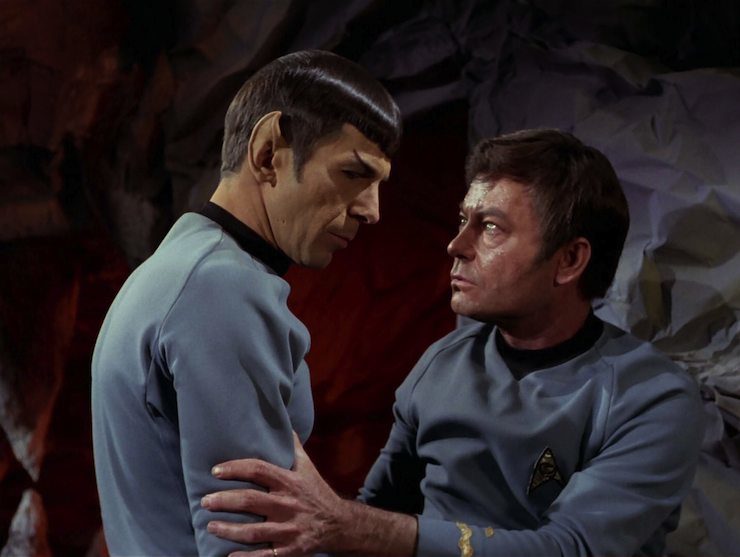
Zarabeth finally admits that she has no idea if the two of them can go back—she only knows that she can’t. McCoy then announces that he’s going to try to go back to his life, so he throws on a fur and heads into the snow. He is soon joined by Spock and Zarabeth, just as Kirk and Atoz find the right disc. Spock says a reluctant goodbye to Zarabeth and Spock and McCoy come back through together.
As soon as Spock and McCoy materialize, Atoz puts in the disc with the period where his family is waiting for him and runs into the portal. Kirk has Scotty beam them up just as the sun goes nova and the Enterprise zips away.
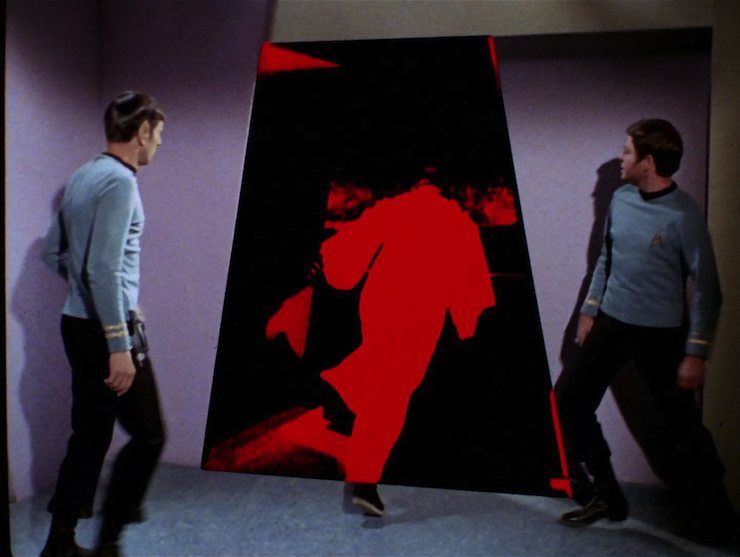
Can’t we just reverse the polarity? The Atavachron is a remarkably sophisticated bit of technology, as it adjusts one’s cellular structure to be compatible with the time period one is going to (whatever that means), but it’s apparently only one-way. Also time seems to pass at the same relative rate between when you go back in time and the place you came back from. Kinda.
Also the process of a star going nova is, er, long, and the notion that a planet can be inhabitable when a star is only a few hours from going nova is specious to say the least.
Fascinating. We find out that Vulcans really were nasty-ass bastards five millennia ago, and also that Vulcans are traditionally vegetarian. The latter will actually be a plot point in the animated episode “The Slaver Weapon.”
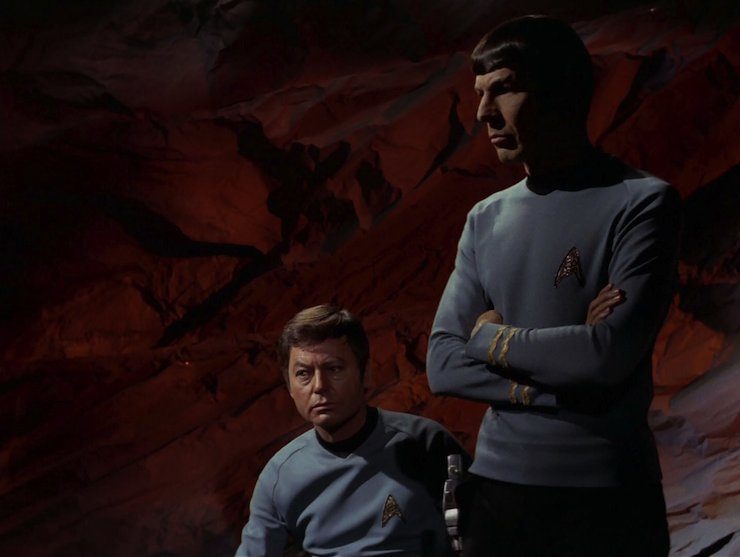
I’m a doctor not an escalator. McCoy proves that, even when recovering from frostbite, he’s smarter, cleverer, and more willing to engage in psychological manipulation than you.
I cannot change the laws of physics! Scotty is not seen in the episode, only heard, and he’s mostly panicking about how the landing party keeps not beaming up to the ship when the sun’s about to go nova.
No sex, please, we’re Starfleet. Spock and Zarabeth fall for each other instantly, though how much of it is the former’s reaction to the first beautiful woman he sights after losing his logical mojo and the latter’s reaction to the first other person she’s seen in years is an open question.
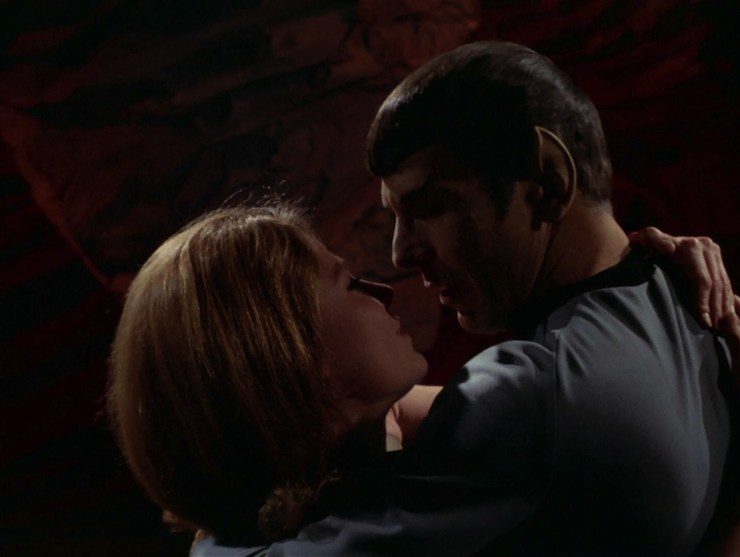
Channel open. “What is this island?”
“It’s called Earth.”
“I know no island Earth.”
Kirk and the magistrate probably not making a sly pop-culture reference.
Welcome aboard. The major guest is Mariette Hartley, who is magnificent as Zarabeth. Plus we’ve got Ian Wolfe, last seen as Septimus in “Bread and Circuses,” playing the various iterations of Atoz. Kermit Murdock plays the magistrate, Ed Bakey and Al Cavens play the two fops, Anna Karen plays the woman Kirk rescues, and Stan Barrett plays the jailer. James Doohan is the only one of the recurring regulars who’s here, and he’s only heard in voiceover.
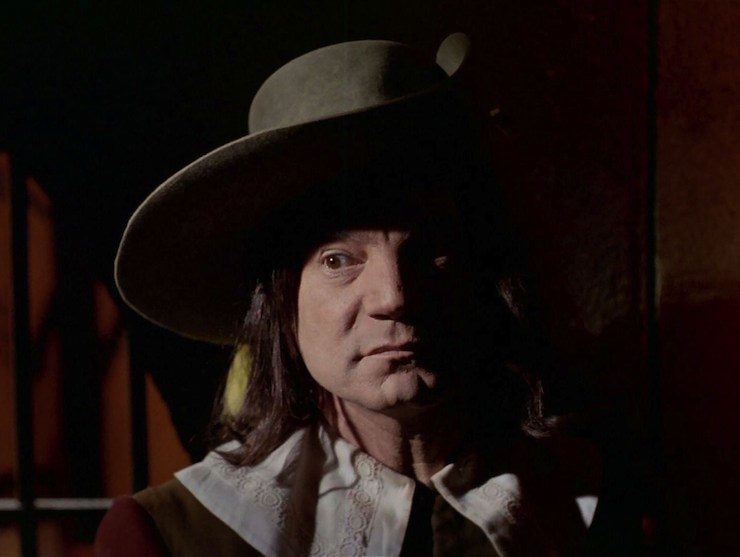
But the episode’s Robert Knepper moment is Johnny Haymer! Best knowns as Sergeant Zale on M*A*S*H, Haymer plays the constable.
Trivial matters: In “Balance of Terror,” it was established that Vulcan had a brutal past before they embraced logic, and just last week in “The Savage Curtain,” it was established that Surak was the primary agent of change from one state of affairs to the current more logic-based one. It’s here that we finally get some kind of time frame for it, as it was at some point less than five thousand years ago.
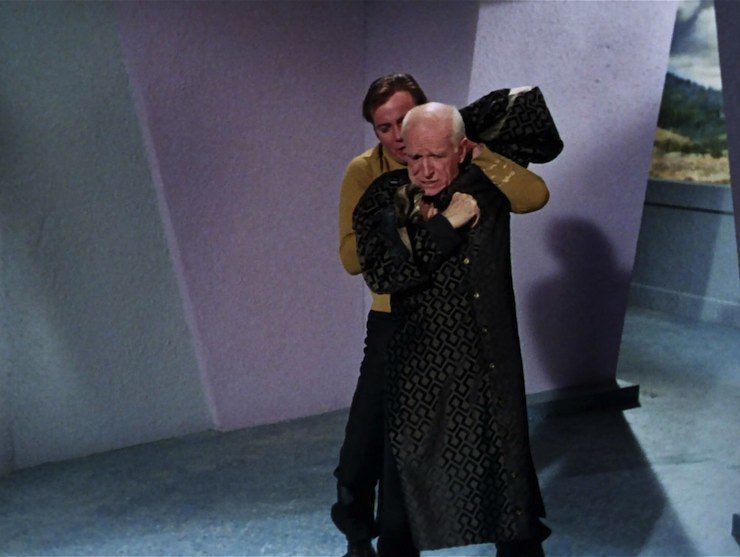
The title derives from Shakespeare’s Macbeth, specifically the classic “Tomorrow…” soliloquy: “And all our yesterdays have lighted fools the way to dusty death.”
This episode received two sequels in novel form, the classic Yesterday’s Son by A.C. Crispin, in which we learn that Zarabeth had a son by Spock, Zar, who is brought to the present day by the Guardian of Forever, and its sequel, Time for Yesterday.
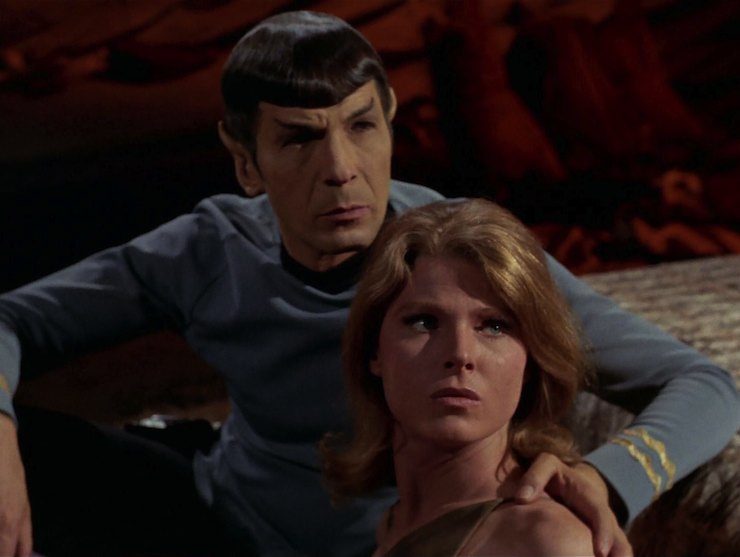
Oddly, the network refused to allow Zarabeth to show her bellybutton, a bit of censorship they had never insisted on before. (We just saw Droxine’s navel a couple episodes ago, after all…) When he cast Mariette Hartley in his pilot for Genesis II, Gene Roddenberry established her as having two bellybuttons, stating that, “The network owed me one.”
Atoz’s name is a play on the alphabet: A to Z. Writer Jean Lisette Aroeste was a librarian at UCLA. This and “Is There In Truth No Beauty?” remain her only screen credits.
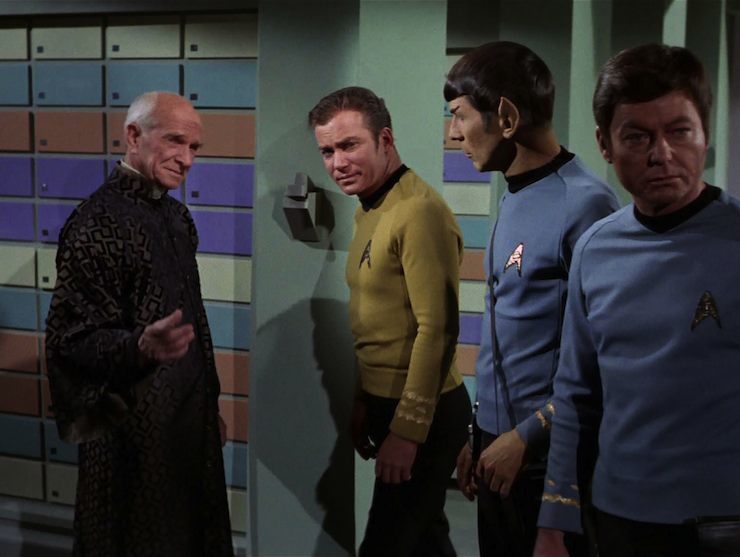
The star Beta Niobe going nova will be referenced in the animated episode “The Counter-Clock Incident.”
Kirk’s arrival in Sarpeidon’s past is only the second outdoor location shot seen in the entire third season, the other being the planet-side scenes in “The Paradise Syndrome.”
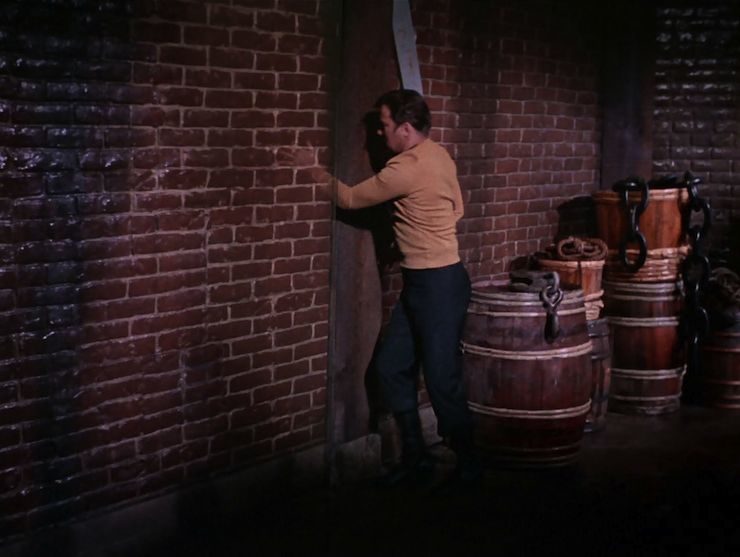
To boldly go. “Witch! Witch!” In a season chock full of blown opportunities and badly executed premises, this episode stands out significantly as one that actually works.
Well, mostly. It’s got some serious logic problems (fitting for an episode in which Spock loses his logic), but those problems are mostly forgivable because of the fascinating character work done with Spock and McCoy.
Leonard Nimoy does a wonderful job showing Spock’s slow breakdown, as his initial reactions aren’t really out of character. After all, snotty is one of Spock’s primary modes, more so when he’s standing next to McCoy, so at first nothing seems amiss. But it gets worse and worse, to the point where even he realizes it—though he doesn’t really confront it until McCoy forces him to.
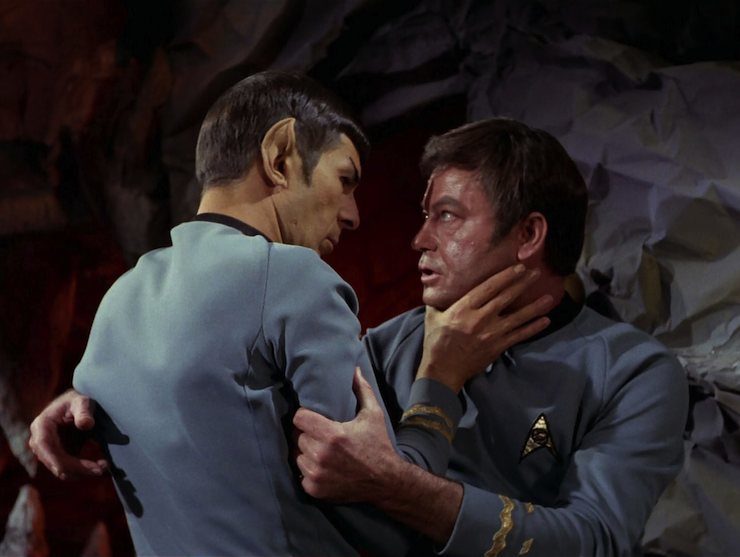
And McCoy is magnificent in this one. Usually Spock’s the one who figures everything out, but he’s impaired this week, so it’s left to McCoy, who reveals the truth in his own inimitable style. Where Spock would provide an infodumpy lecture, McCoy prefers to psychologically goad Spock in such a way that he’ll figure it out himself and do something about it.
What I particularly like about this strand of the plot is what it doesn’t do. At no point do Spock and Zarabeth declare their undying love for each other which, after the insta-love affairs of this season (“For the World is Hollow and I Have Touched the Sky,” “The Paradise Syndrome,” “The Lights of Zetar,” “Requiem for Methuselah“) comes as something of a relief. This isn’t a love affair—this is two very lonely people finding each other and finding comfort in each other’s arms. For Spock, the loneliness is psychological, but no less real for all that. For Zarabeth, it’s much more tangible, and while McCoy may be overstating the case by saying that she’d kill as many people as possible to keep Spock around, he’s not wrong in his conclusion: Zarabeth is desperate for companionship, justifiably so.
Kirk’s strand of plot is less compelling, though it’s amusing to see Sergeant Zale as a posh-talking constable. Still, it’s all standard stuff with Kirk basically being awesome (he wins the swordfight! he breaks out of jail! he convinces the magistrate to help him! he overpowers Atoz!) and never challenged, and the past he goes to is a tiresomely generic old-timey land of pre-Enlightenment awfulness. At least the costumes are cool…
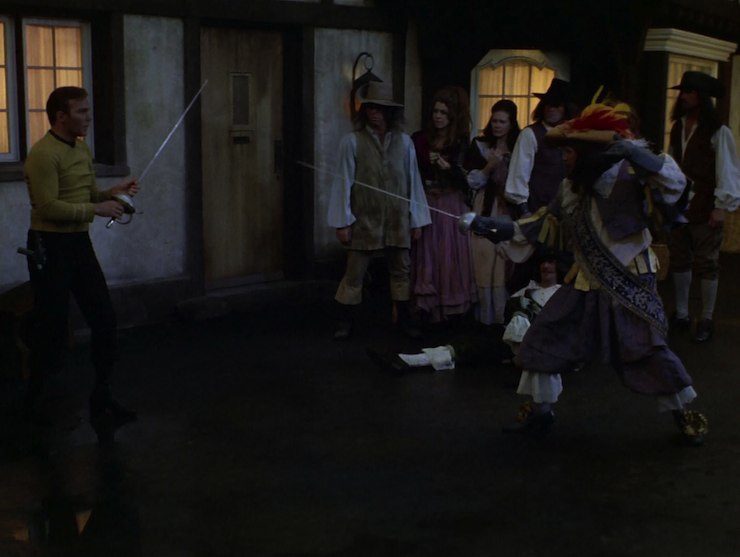
The concept is a good one, even if it shows iffy knowledge of how stars going nova actually, y’know, work. Still, the notion of escaping planetary destruction, not by going through space, but instead going through time, is rather a nifty one.
If only this was the final episode, the show could have concluded on a somewhat positive note. Alas, it is not to be, as we’ll see next week…
Warp factor rating: 7
Next week: “Turnabout Intruder”
Keith R.A. DeCandido has just revealed the final cover for Marvel’s Warriors Three: Godhood’s End, the third and final book in his “Tales of Asgard” trilogy, which is available for preorder from Amazon and Barnes & Noble, and will be released in the spring of 2017.










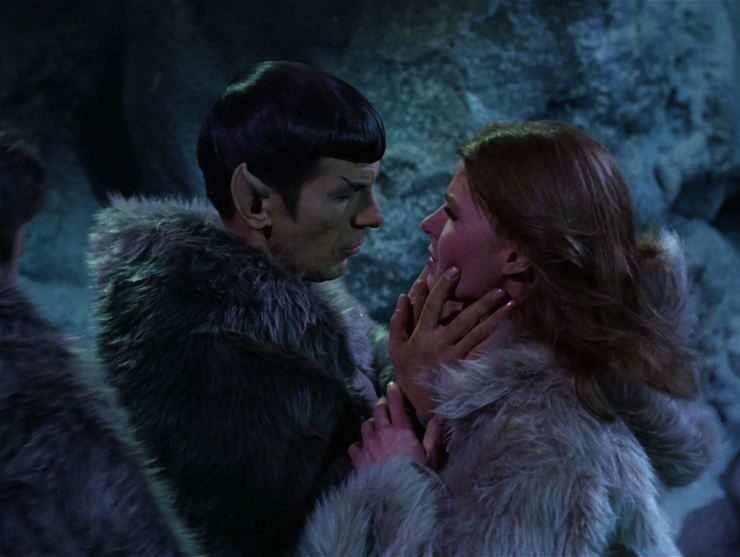
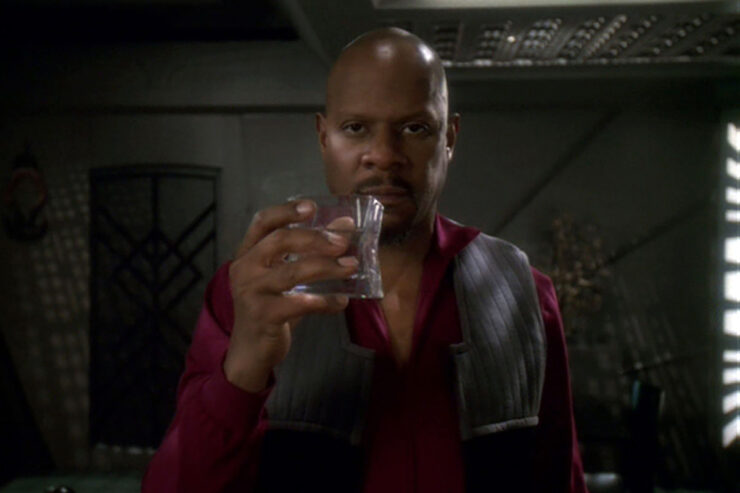
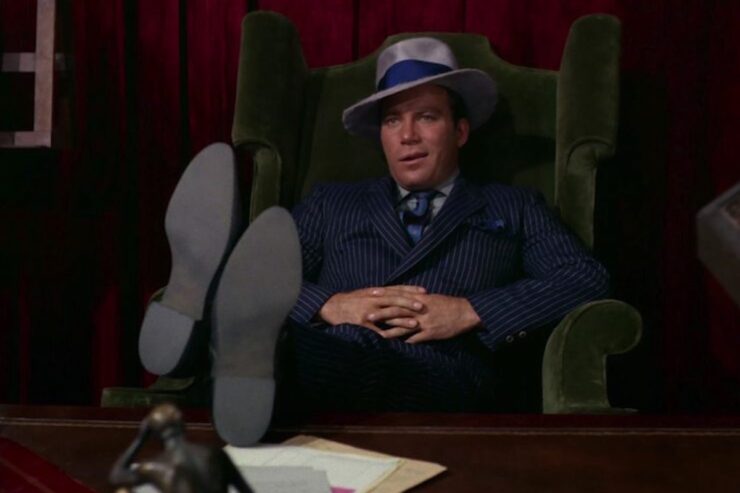
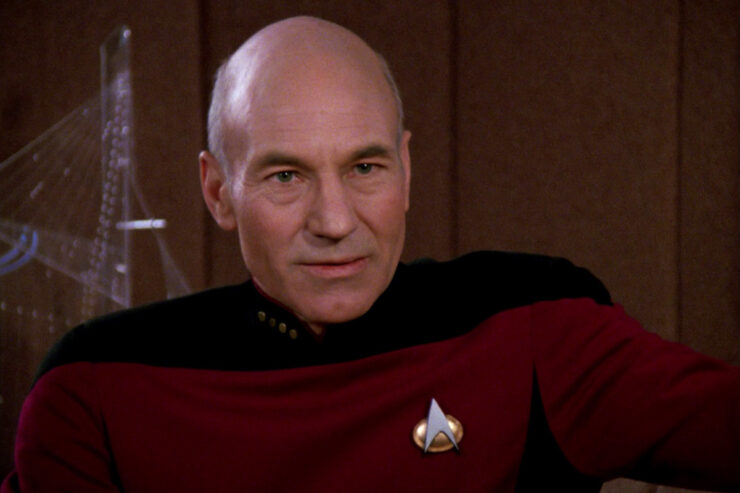
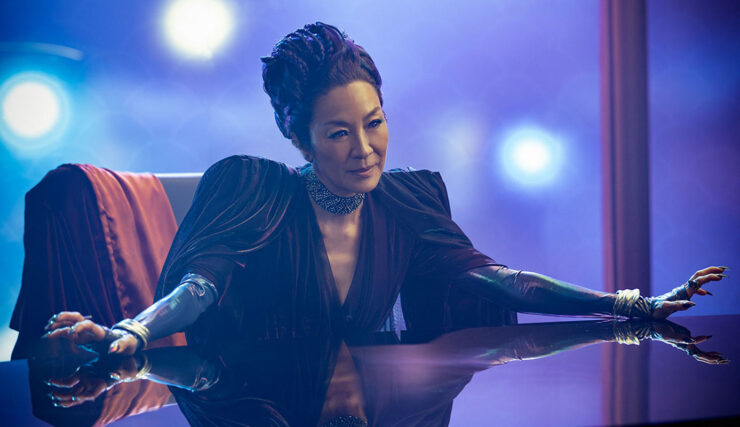
This is one of the few episodes I own on VHS (although I think whoever got it for me intended to get The City of the Edge of Forever), so assuming that the VHS player I have still works and I bother to run the cables to hook it up, this is one I could go watch. At least it’s a decent one. :)
Also, to be fair, this is far from the only sci-fi story that uses the concept of rescuing people from a star about to go nova. I think that the idea that the Sun, which we think of as being unchanging and eternal (even if we know better), might explode makes for a powerful story. Sure it’s not at all how that really works, but when has ST ever let that get in the way?
We’re already at the end? Oh well.
Yes, this would have been a much stronger finale than Turnabout. And it seems there was a 3 month gap in air dates. I guess NBC never imagined the marketing power of DVDs with unaired material, and decided to dump off the last hideous episode to get something out of it. But that’s for next week.
I do think the idea of an advanced planet whose technology went a completely different direction from spaceflight, is interesting.
StrongDreams: We’re already at the end of the third season, yes, but not at the end of the rewatch. There’s “Turnabout Intruder” next week, there’s the third-season roundup the week after that, and then we start in with the animated series, which will keep us going another 23 weeks at least. :)
—Keith R.A. DeCandido
This was a good episode. I am cringing at the thought of Turnabout Intruder.
One of my favorites. I first encountered “All Our Yesterdays” episode not on television, but in the Star Trek Fotonovel published in the late 1970s, which I bought at a used bookstore in the early-to-mid 1980s. I thoroughly enjoyed reading it. A short time after that, during the summer of 1983, came the publication of the novel Yesterday’s Son by A.C. Crispin, which was a direct sequel to the episode. I bought that novel when it first came out and read the whole thing within 24 hours—I couldn’t put it down, and it remains my absolute favorite Star Trek novel to this day. It was only after reading the Fotonovel and Yesterday’s Son that I finally got to see the actual television episode. So I guess you could say that I was predisposed to liking it. I did then, and I still do now. Without question, there are plot holes and some lapses in story logic, but the character stuff truly shines and makes you willing to overlook those kinds of flaws. The Spock/McCoy stuff is great—their devotion to each other and their mutual animosity laid bare.
Mariette Hartley makes an indelible mark as Zarabeth (she would do the same thing a decade later on The Incredible Hulk). She has great chemistry with Nimoy. It’s hard to think of Mariette Hartley as ever having been sexy—attractive, definitely, but sexy? Not so much. But she really pulls it off here and turns in a sensitive, memorable performance that makes you like her and really feel for her, especially at the end when the inevitable happens.
It’s funny—Spock’s entire relationship with Zarabeth is about as long as Kirk’s relationship with Rayna in “Requiem For Methuselah,” but I can buy Spock/Zarabeth a lot more easily. Their circumstances (Zarabeth’s profound loneliness and longing for companionship, Spock’s sudden lack of control over his emotions) make their love story far more believable and powerful. Far as I’m concerned, this is one of the very best episodes of the third season, and a pretty darned good episode of Star Trek in its own right.
Yes, Hartley makes the episode work, along with the Spock-McCoy stuff. But there are so many plot holes. Why do you need to be altered to live in the past, when that’s never a factor in any other time-travel story? Why would being “altered” on a cellular level make Spock act just like Vulcans from the period he was sent to? How would a Sarpeidon machine know anything about Vulcan behavior in the past? Their adoption of logic isn’t a biological change anyway, but a cultural one. This makes no damn sense.
Also, how did the Sarpeidons master time travel without having space travel? How did they send their entire population into their past without wreaking merry hell with their timeline? (Unless it was a causal loop wherein they invented time travel because of the knowledge they got from people who were sent into the past by time travel. I touched on these questions in a chapter of my novel Department of Temporal Investigations: Forgotten History, but was unable to come up with any good answers.)
And Kirk’s part of the story is just silly. I hate the episodes that assume that alien worlds would recapitulate Earth’s development exactly right down to the costumes and scenery and accents. It would’ve been nice to get a more alien version of a society that feared witchcraft. Also, Atoz and his robot duplicates were one of the random tossed-in bits of weirdness that characterize both of Fred Freiberger’s genre-TV turns, ST season 3 and Space: 1999 season 2.
On the “nova” question, part of the problem is that what we’re actually talking about is more properly called a supernova. This probably hadn’t been figured out yet in the ’60s, but what we call “novae” are actually periodic eruptions on binary stars where one component is a white dwarf or neutron star sucking up matter from its companion’s atmosphere and concentrating it to the point of fusion — pretty much exactly what TNG showed in “Evolution,” one of the best bits of accurate science in Trek screen history. As for supernovae, the kind of stars that have those at all are too short-lived to support habitable planets, so the idea of an inhabited world’s sun blowing up just doesn’t work.
Speaking of definitions, “atavachron” is Greek for “ancestral time.” “Sarpeidon” is presumably a variation of Sarpedon, the name of several characters from Greek myth. Most likely the reference is to King Sarpedon from The Iliad, whom his father Zeus allowed to die because he was fated to be killed by Patroclus. Beta Niobe would have to be the second-brightest star in an imaginary constellation named for Niobe, the woman famous from Greek mythology for having her seven sons and seven daughters killed by Apollo and Artemis as punishment for her hubris, leading her to turn to stone in her grief. (In “The Counter-Clock Incident,” the alternate-universe counterpart of Beta Niobe is called Amphion, which was the name of Niobe’s husband.) So both names are derived from myths pertaining to inescapable death and grief — fitting for a world about to be destroyed. (I’m surprised Zarabeth wasn’t given a name from Greek myth too.)
@2, @3, and then Keith is going to start the rewatches of Voyager, followed by Enterprise. So there’s tons of material left to cover ;)
@7/Jason: I think if Keith were going to do VGR or ENT rewatches, he would’ve done those in sequence after DS9 instead of jumping back to TOS/TAS.
@8 oh he’s made it very clear that he is not doing them. I’m just giving him crap about it. :)
Haven’t watched this one in awhile, so forgive my question, but is it ever stated in the episode that the Atoz duplicates are in fact robots? Because I was thinking maybe they are actual duplicates produced as a result of time travel, kind of like how you have multiple Doc Brown’s and Marty’s running around in BttF2.
@10/Robert B: That’s a clever idea, but it doesn’t quite work. The third Atoz they meet refers to the others as his “replicas” and that he is the “real” one. He also says he had to delegate the simpler tasks to his replicas, suggesting they have a more limited capability than he does. And their behavior is more subservient and repetitive than his. Also, the “real” Atoz is the only one who escapes at the end; the replicas are treated as expendable. So it’s not clear whether they’re androids or some kind of biological duplicates, but they’re some kind of programmed, artificial constructs.
@11/Christopher: They’re probably his grad student assistants. :)
Based on what we now know about solar system formation and stellar evolution the story could just barely work. The supernova would have to by type 1a (matter accretion onto a white dwarf). The other star would be main sequence and they would be in close orbit. The planet would then be circumbinary (there are a number of known examples). In such a scenario the population might have time to devise an escape plan and the planet could be marginally habitable until shortly before the final blast.
In James Blish’s adaptation of this episode, Zarabeth admitted to Spock and McCoy (after McCoy convinced Spock to try to return) that she lied about their not being able to go back. Which I found problematic for two reasons: (1) They never told her (as Kirk had told the magistrate) that they were not prepared, and (2) She never told them (and may herself have been unaware) that if you aren’t prepared you can only survive for a few hours (days in Blish’s adaptation). Imagine how upset she would have been if she went through this pretense to keep companions with her only to have them die shortly. She couldn’t have knowingly withheld this information from them, so the episode works better than the adaptation in this detail.
Can’t resist pointing out that Seven of Nine visits Sarpeidon (due to to some time-traveling weirdness) in my novel NO TIME LIKE PAST, in which I believe I implied that the other Atozs were actually holographic duplicates along the lines of the EMH on VOYAGER . ….
That’s one of the reasons I prefer watching TOS in stardate order. In that order, this episode is indeed the finale.
For a special treat, watch the remastered version in stardate order. Then you’ll have, as the very last scene in all of TOS, the spectacular visual of Beta Niobe going nova and taking the now unpopulated Sarpeidon with it. Don’t really know why it works so well as final scene, but it does.
Nice. This is one of the handful of episodes I’ve yet to see. Thanks for the review, Keith. Going to watch it right now.
@13/Charles Rosenberg: The problem with the idea of it being a Type 1a SN is that I believe those are the final death throes of a binary pair that’s been a periodic nova star (as previously described) and finally builds to the point that the explosion becomes big enough to destroy both stars. So any planet around the pair would have been subjected to multiple prior radiation blasts and would probably be very far from habitable.
I’m not concerned with time travel (via atavachron) requiring a metabolic adjustment. We’ve seen several types of time travel in Dr. Who, for example, and some of them are less perfected and more prone to error or even injury than Tardis travel (Magnus Creel’s Zygma Beam, for example). So maybe the atavachron is a bit unperfected and rather than perfect the machine, they installed a metabolic compensator.
Presumably, if Spock had been adjusted, he would have remained his coldly logical self. What makes less sense (or none) is an unadjusted Spock reverting to the appropriate mental state for Vulcans 5000 years previous.
@Greg Cox #15 That’s one of my all-time favorite Trek novels!!!!!
@StrongDreams #19 I vaguely remember reading somewhere (it might have been in one of the sequel novels, or perhaps a novelization of this episode…I honestly don’t remember) that Spock was actually “altered” by psychically picking up the unfiltered passions of the Vulcans of the time period he was in (something along the lines of how he was able to “feel” the crew of the Intrepid dying), and that mojo overpowered his mental controls. Non-canon, obviously, but it is a “logical” explanation that addresses the issues others have mentioned in this thread!
I followed this time-travelling story back to front, from Time for Yesterday to Yesterday´s Son to this episode, and somehow it felt right. Time for Yesterday is for some reason my most-often-reread Star Trek novel, and, when I think about it, one of the few books I re-read at least once a year. But I´ve seen this episode only once… time to rewatch.
I find the idea of timetravelling as a means to escape fascinating (however the reason to escape, the whole supernova thing, doesn´t really make sense), and it also made me think: so, could there be more than one way to travel through time? Like, one is the usuall: if you go back, better don´t step on any butterflys and such, it can change the whole future… but is there a way to travel through time without danger of causing paradoxes? Perhaps something only Sarpeidonians figured out.
There was a review of the Yesterday’s novels by EllenMCM here at Tor a few years ago. Her plot summary is great: ” it’s like a very, very short version of Game of Thrones, with time travel standing in for incest.”
@19/StrongDreams: But why would a time traveler’s metabolism need to be changed for a different era? Why would people’s metabolism or cellular biology be different in the past than in the present? Any significant evolutionary change would take far longer than 5000 years to manifest, unless it’s something minor like, oh, lactose tolerance in adulthood evolving in pastoralist populations.
Although — here’s a thought — maybe it’s about immunity. Disease organisms reproduce and evolve much faster than humans or humanoids, so people from the present would lack immunity to diseases from the past, and vice-versa. So maybe the preparation is to the immune system. But that would lead to the question of why lack of immunity isn’t an issue for time travelers in any other story.
That doesn’t make sense regardless of whether he’s “adjusted.” Again, Vulcans’ adoption of logic was a cultural change, not a biological one. Not to mention that he’s hundreds of light-years from Vulcan, so why would the behavior of Vulcans on a distant planet have any effect on him on Sarpeidon? Although there is the fan theory DonRudolphII mentions in #20 about Spock being telepathically influenced by the Vulcans at the time. Which still seems like a bit of a reach to me.
@@@@@ #20 DonRudolphII: I remember reading something like that too – I think in one of the old Best of Trek books. That explanation makes better sense to me than the idea that somehow Spock just reverts to the mental state of ancient Vulcans because he’s traveled back in time.
I guess Spock’s reversion doesn’t make much sense (especially since McCoy doesn’t become 5K years less civilized, and Kirk doesn’t start believing in medieval stuff), but Nimoy sells it so well, I can hardly care.
The logical bugaboo that gets me is: When Kirk goes through shortly thereafter he ends up in “17th century England,” which was what he was looking at in the closest viewing station at the time. But McCoy and Spock end up in the ice age, which was being shown at the viewing station clear on the other side of the library – right? How does that work, exactly? (And apologies if I overlooked someone explaining this above.)
I am glad the aired version doesn’t establish Zarabeth as a liar, as Blish’s version (presumably, following earlier script drafts) does. She is a lovely presence in the episode, physically and emotionally.
@25/Mike: They were sent to the periods that they were viewing, not the one closest to the portal. As explained in dialogue, the atavachron was somehow linked to the reader devices, essentially tracking the users’ browsing history, so to speak. Kirk was looking at a disk about the medieval period, and McCoy was looking at one about the ice age. Spock went with McCoy because the two of them stepped through at the same time, and Spock hadn’t looked at a disk of his own.
Essentially, the landing party thought the viewers were just for reading the “books” in the library, but they were really selection devices for the time portal.
Did they ever explain where all the heat in the cave was coming from? (Other than from Spock and Zarabeth, of course)
@27/jmeltzer: Zarabeth said there was an underground hot spring providing the heat.
I’m going to go with the time portal being a technology so different from ours it’s like magic. When I stop trying to figure out how it works and just try to understand what it’s doing, it makes sense.
So, this is a time travel system that allows time travel but does it without changing the past. Somehow, the people are literally altered to fit into the periods they go to and, through some means we don’t understand, this alteration also keeps them from changing the past in significant ways. Part of the alteration is done by the portal. This is why Spock begins to change once he goes through. But, there are steps that need to be taken to complete or stabilize this change.
I think we can assume this stabilization allows a person to fit into the past in some way as well. Hence, one traveler has become a magistrate in a period that’s very like our renaissance, something that would have been hard to do in our version without a known background and family.
Kirk, on the other hand, can’t last five minutes before he’s a walking anachronism on trial for witchcraft. Granted, he’s Kirk. That’s what we expect of him. But, still.
Maybe Spock reverts not due to any “adjustment” nonsense but because of the profound telepathic influence of billions of violent Vulcans running around? We know from The immunity Syndrome that the death of a mere few hundred Vulcans could reach out and impact him and, implicitly that “shockwave” traveled faster than light. So billions of wildly aggressive, mildly telepathic Vulcans “sending” constant illogical energy took their toll. Maybe that’s why Vulcan society appears so conformist at times– a critical mass of people acting a certain way can influence the larger whole in ways non-telepathic societies aren’t vulnerable to.
At least, I can’t come up with anything better…
I like this episode, despite its flaws. And oh no, we’re coming to the rewatch’s end… what will we do now? Oh? Really? We’re getting TAS? YAAAAY!!!
@19 – StrongDreams: And in the Spanish TV show “The Ministry Of Time”, the titular Ministry’s time travel method is harmless to people, but their competitor’s (US corporation Darrow) causes cancer over repeated uses.
@23 – Chris: What StrongDreams means is that the Atavachron damages people metabolism or cellular structure when they travel through time, and the way they found to fix that was one that renders them unable to go back through the machine again without suffering irreparable damage.
I always thought that the adjustment was to prevent people from returning back to the library after they were sent through. Perhaps the first people who travelled to the past ended up dying due to some quirt of the method used. The adjustment would later be added to permit them to travel through once. If they returned, they would die, just like the first first did. Perhaps if there was a way to be “prepared” in the various time periods, they could return to the library. It’s a side effect of the method used, much like the damage caused by the subspace transporter in TNG.
You wouldn’t want people to get buyers remorse and try to return to the library for another choice, They cut it close just getting everyone through the first time. Having people return for second or third choices would have resulted in a lot of people not being able to escape.
Still, a very silly episode for the most part but Nimoy and Hartley have great chemistry and are the only saving grace. However, as far as any actual science goes, well, Nimoy and Hartley have great chemistry. Did I mention that?
One plot detail that really helps the episode maintain a sense of urgency and tight pacing is the supernova itself. While the idea of a planet still being livable at this point is questionable and debatable, the very notion of impending doom helps to ground the action into a believable timetable. For one thing, it’s based on the realistic idea of inevitable death. Like people themselves, planets and stars eventually crumble. The episode’s title fits the concept rather well. When we’re facing the end, all we’re left with are our yesterdays.
While the Kirk side of the story isn’t that interesting, the Spock/McCoy thread more than makes up for it. Talk about a slow, agonizing descent into primal emotionalism. The love story also works because it isn’t born out of melodrama or pure attraction. The idea of two lost souls finding common ground feels far more mature and better executed. Between that and the blossoming anger, Nimoy really set the standard for all posterior Vulcan characters.
If anything, few of them managed to live up to that standard. Naturally, I tend to recall Voyager’s season 2 entry, Meld, in which a mindmeld with Suder shortcircuits Tuvok’s logic barriers, driving him into an equally slow and agonizing descent into primal emotions and madness.
Much like Tuvok, who had a holodeck program in which he kills Neelix in cold blood, I can picture Spock having a similar scenario involving him choking McCoy to death. Clearly, when you’re bottling up emotions like that, you’re bound to indulge in some questionable revenge fantasies. I wish holodecks existed in the Original Series just to see that side of these characters (what little holodeck action we get in the Animated Series is too brief and too far removed from what the concept would eventually evolve towards on TNG and beyond).
I do wonder what the effect would be of having a large number of people from the future spread throughout Sarpeidon’s history? Do they use knowledge of the future for their own gain, like getting rich by playing the stock market and betting on the Sarpeidon World Series? Do they stand by and let people die for the lack of medical knowledge that was commonplace in the 23rd century? I can imagine knowledge of the future gradually dispersing throughout different eras of Sarpeidon’s history. Imagine the cults and prophetic religions that might grow up around people who truly and unequivocally do know the future. Maybe it was an accepted fact in some time periods: “Oh, yeah, there are future people around. You meet them every once in a while, and they’re all kinda weird.”
Although this was the first TOS episode I saw, at around age 10, I managed to completely drop Kirk’s trip into the past from my memory. In my mind, for 25+ years, this episode only had Spock and McCoy in the past.
I rather like cosmotiger’s explanation in @34 though. :)
@34,
Suppose the nova had been predicted far enough in advance that much of the population decided to stop reproducing, leaving only a remnant to travel to the past? Maybe Sarpeidon naturally had a much smaller population for other biological, social or economic reasons.
I do like the idea that a metabolic adjustment would need to be made for disease purposes; to add immunity to past diseases and remove the threat of a pandemic caused by the introduction of a modern pathogen. There isn’t really any other reason unless the atavachron itself causes the damage (that is perhaps pre-repaired by a different process that Our Heroes didn’t go through.)
I also like the idea that the adjustment was somehow mental and sociological, to enable the person to fit better in their chosen time and not make too many ripples that would risk changing the future. You could mentally condition someone to keep a low profile, I guess. Making “room” for them in that society seems too much like magic though. (Being named a magistrate would not be that hard, with a letter of introduction from a suitably distant province, and some hefty social climbing, aided perhaps by knowledge of which colonial ventures to invest in.)
@26/Christopher – Thanks. I missed that, but it makes sense, I guess, since the individual has to be prepared for the time period they visit.
Has anyone ever linked the atavachron to the Iconian gateway technology from TNG? Seems like a variation on the theme.
I don’t like this episode as much as everybody else does. I find it bland. Perhaps it’s because I’ve read Nimoy’s books before I watched it – he complains that the writers wrote a love story for Spock without considering that Vulcans don’t fall in love like that, and that they added the rather nonsensical explanation only after he pointed this out to them – but to me it feels as if Nimoy is mostly annoyed that he has to play being in love with Zarabeth.
“Still, it’s all standard stuff with Kirk basically being awesome”: IMO Kirk is ridiculously incompetent here. He never seems to figure out that he has travelled through time, and if the magistrate hadn’t by pure chance been another time traveller he wouldn’t have made it back. This is supposed to be the same guy who managed to assume the role of a gangster boss in A Piece of the Action or his own evil counterpart in Mirror, Mirror? And when he gets back to the library by sheer good luck he beats up an old man who only tries to help him. I’m kinda particular about my heroes – I don’t like it when they beat up old men. If Kirk had acted like that all along, he never would have become my favourite character.
I also dislike the Sarpeidonian 17th century because it looks exactly like, well, the 17th century. Usually I don’t mind Earth-parallel cultures, but the costumes from that time period are so detailed and specific that I have a hard time accepting them as something from an alien planet.
Now you will all stop taking me seriously, but I actually prefer Turnabout Intruder as a series finale. For all its problems, at least it features the entire main cast (except Uhura), it takes place on the Enterprise, it mentions a few past episodes, and it has the crew be loyal and supportive and work together.
@38/Jana: It’s hard to imagine being annoyed about having to play Mariette Hartley’s lover.
As for the costuming coincidentally recapitulating Earth history, “The Return of the Archons” had the same problem. I sometimes imagine that what we saw was just the TV show’s symbolic representation of the real, more alien costumes, architecture, etc., “translated” into Earth terms so we’d understand the cultural context.
@39/Christopher: Yes, Mariette Hartley’s really cute. I don’t know why the episode doesn’t work for me. I want to like it more than I actually do. (I’m talking about the Spock-McCoy subplot; I know exactly why I don’t like the Kirk subplot.)
“‘The Return of the Archons’ had the same problem.” – Absolutely. It feels wrong for the same reason. But at least you came up with an explanation for that one in one of your novels.
@40/Jana: My regard for Hartley has less to do with her physical appearance than it does with her warmth and charm. She’s not bad-looking, but it’s always been her personality that I’ve found most engaging.
@41Yes, Mariette Hartley was one of the most charming actresses of the day. Itis the reason her episodes in The Incredible Hulk were loved. It’s also the reason that the Polaroid commercials made with James Garner, another charming actor, were a huge hit, to the point where some people thought they were actually married. She was a good actress who made her characters interesting on many levels.
@38 – ” IMO Kirk is ridiculously incompetent here. He never seems to figure out that he has travelled through time, and if the magistrate hadn’t by pure chance been another time traveller he wouldn’t have made it back.”
Actually, Jana, no that isn’t quite so. Remember how in Kirk’s log entry, he explicitly states that “The people of this time believe in witches”? And he cajoles the Prosecutor into freeing him and leading him back to the portal by threatening to expose him as being from the future, and therefore a “witch”. So Kirk is well aware of his time-travelling, and how to effect a return.
It does seem a bit of luck that the Prosecutor happened to be from the future, but who’s to say? Considering the nature of the situation, it could be that a huge percentage of the Sarpeid population in any given time period were closeted Futurites. The odds of that being so could have been extremely high.
I loved this episode. it was my second favorite of the season, after “The Paradise Syndrome”.
@43/Kevin: I don’t think it’s that great a coincidence, since two people who selected the same disc in the Library would presumably be sent to the same place and the same approximate era (though it seems that both sides of the Atavachron advance in chronological sync with each other, which is why the prosecutor had time to establish himself). Some might move away from the portal area, while others might stay near it.
@43/Kevin: You’re right. I take back the “never”.
But when he is first interrogated, he tells the magistrate that he was reading in the library, and that makes no sense – at that point he can’t know that the magistrate is from the future too. He should assume that nobody knows about the library and avoid mentioning it. If there had been some indication, some slip on the magistrate’s part first, then we could see Kirk arriving at the conclusion that he’s found another time traveller. But unless I missed it, there wasn’t any.
Hmm, I guess we could make something up. Perhaps the magistrate looked healthier or was bigger or otherwise different from his alleged contemporaries? Still, I wish something like that had been apparent in the episode. Also, it would have been fun to see Kirk talk his way out of prison.
@45/Jana: I just looked over the transcript. When Kirk steps through the portal, he doesn’t yet know it’s a time machine (although he could’ve deduced that from the name if he knew his Greek, although I don’t know why Sarpeidonites would have Greek). At first, he thinks the street is just on the other side of the portal, which does come off as a bit dense, given that he knew there were no life signs on the planet before they beamed down. But maybe he thinks it’s a transporter through space but not through time. Spock then figures out it’s a time portal and tells him that through the atavachron link, so Kirk does know by the time he encounters the magistrate. Still, he does offhandedly mention the library, and it isn’t until he sees the magistrate’s reaction to the word that he realizes the man is from the future. So it’s unclear why he thought he could use it as his alibi.
@46/Christopher: Okay, so he’s really not at his best here.
@46/Chris- Yes, you are correct. It’s been awhile since I last viewed the episode; I’d forgotten about the exchange between Spock and Kirk, before he was flogged and hauled away by the Constable. It does seem to me that Kirk was fishing when he brought up the library to the Magistrate, not wanting to let on his true origin until he gathered how much the man knew about time-traveling, and whether he could use that knowledge to plead for aid in his escape. Such might also be considered a temporal application of the Prime Directve, which Kirk followed by stating he was from “an island called Earth”, rather than revealing himself to be an alien.
One of my favorite and especially geeky bits of Trek trivia relates to this episode. The sound effect used for the Atavachron was the IRIG-B time code transmitted by standard time and frequency stations WWV/WWVH back in the 1960s. (The format has since changed.) A time code sound effect always seemed highly appropriate for a time machine.
Very late to the party, I know, but I found an interesting analysis of the ‘final draft’ of this script, which must not have been all that ‘final’ because it differs a lot from the aired version. The aired version did a much better job of making the Spock-Zarabeth relationship come to life, according to this:
http://www.orionpressfanzines.com/articles/all_our_yesterdays2.htm
This was the very first episode of Star Trek I ever saw, and I was absolutely hooked by the Spock/McCoy interplay; it’s probably safe to say that I was a Spock fan first and a Star Trek fan second. It’s still one of my favourite episodes, despite the gaps in logic, and its two prose sequels are among my favourite Trek books as well.
I’ll join the chorus in praising the chemistry here between Nimoy and Hartleyy. Absolutely beautiful stuff. And I’d also second CLB’s description of Hartley. Yes, she’s pretty, but that’s not what makes her take over the screen when she’s on it. She’s just so sympathetic and there’s a sense of …. goodness about her. Which makes for perfect casting in this role. Another actress might have seemed manipulative and conniving when you consider that she was withholding the truth so she could have companionship. But with Hartley in the role, you feel for her. You can’t blame her. Without words, really, she conveys the desperate loneliness that she once again faces if she tells the truth. One of the more tragic figures all of Star Trek in my opinion. I almost hated McCoy for figuring her out.
A bit late to the game, but there’s a typo in the text that no one seems to have caught: Ian Wolfe’s name is given as “Ian Wofe”.
@53 – Fixed, thanks!
@7 Or, he’ll spend years rewatching every single superhero movie ever made THEN do Voyager. Slight diff.
wizardofwoz77: Or that, yeah. *laughs*
—Keith R.A. DeCandido, who is amused at how many times his commenting that he wouldn’t rewatch Voyager is biting him on the ass
My question concerns the end after McCoy and Spock return from the ice age. What if the nova was still a few hours away from exploding and Atoz had additional time to program/prepare Spock to go back to the ice age and to Zarabeth. Would Spock have gone back to stay with her for good?
@57/LW: “Would Spock have gone back to stay with her for good?”
I’d say no. Spock was a creature of duty, and incredibly loyal to his captains. When he was stuck in the past and not sure he’d ever find his way back, and when his logic was compromised by whatever was going on there, he was susceptible to his feelings for her. But if he were back in the 23rd century with his judgment recovering and with a choice to make between following his duty and following his heart, he absolutely would’ve chosen his duty. (Or, if you want to get slashy about it, his emotional attachment to Kirk would’ve outweighed his attachment to Zarabeth.)
Plus, of course, it was episodic series television, so that would never have been an option. No matter what the circumstances in the story, the payoff would’ve been that Spock returned to the present and the status quo. If, through some improbable circumstance or badly out-of-character writing, Spock actually had decided to go back and stay with Zarabeth, then the star would’ve gone critical and Kirk would’ve had him beamed up just seconds before he passed through the portal.
I feel for Zarabeth, condemned to solitary exile. But I also feel for the frustration of the archivists on the Enterprise, who must have been expecting to have a few hours to loot the library, after the captain and first officer determined that it was safe. That’s what you do to a no-longer populated planet that is about to be destroyed, isn’t it? Rescue what records and artifacts you can?
Ir, the Enterprise does a slingshot maneuver, goes back in time, picks ip Zarabeth and returns to the present. No Atavachron to worry about and with time travel, they can be back as soon as they left.
That, of course, only works if they know precisely, that is to the hour, where to go and that they actually have that precise a control over a slingshot maneuver. Seems unlikely to me.
@61 – Seeing as they pretty much nailed the slingshot maneuver in a old bird of prey, a ship they were not familiar with, and that Spock was experiencing lingering memory effects from the whole “I used to be dead but now I’m not and I’ve got my marbles mostly back where they belong” thingy, I don’t see that as much of a problem.
Spock could have saved her if her really wished to.
62. kkozoriz
@61 – Seeing as they pretty much nailed the slingshot maneuver in a old bird of prey, a ship they were not familiar with, and that Spock was experiencing lingering memory effects from the whole “I used to be dead but now I’m not and I’ve got my marbles mostly back where they belong” thingy, I don’t see that as much of a problem.
Spock could have saved her if her really wished to.
Naile it? As far as I could see they made a jump back to sometime 20th century. They weren’t going to any particular time at all. They would have been as happy to be in 1910 as 1990’s sometimes; or 1810 or 1510. They were better coming back, but that could easily be interpreted as doing backwards what they just did.
You might make an argument from Assignment Earth. But even then there would be a difference between precision three hundred years and precision for some number of thousands of years, which is when Zarabeth was.
And even if they could be so precise, when did they find out when she was? I doubt they had any time to determine that after returning to the Library.
Kirk was in the library when Atoz discovered where Spock & McCoy were in time.
Also, if you can time travel, the amount of time you spend searching for someone doesn’t matter much because you can always jump to another time and check there. If, for example, the locate her remains, then they know to jump back 50 years and look again. They can narrow it down fairly easily.
That’s the problem with time travel stories, particularly ones where the protagonists are in control of the time machine. They can go back and make another attempt if they fail.
ATOZ: All right, all right. All right! It must be the Sarpeidon Ice Age, five thousand years ago. Let me look.
And
SPOCK: Yes, it happened. But that was five thousand years ago. And she is dead now. Dead and buried. Long ago.
Both Kirk and Spock know the general time period. They could have found her if they wanted.
And since Zarabeth would have lived and died alone, brining her forward in time would have no effect of the time stream. Unlike, say, Gillian Taylor.
There certainly was no indication that the exact date was on the disc. Indeed, he was calling out through the portal while Atoz was scanning. Even if he saw the date on the reading, is there any indication that they would know how that planet noted time. If I noted the today’s date by the Aztec calendar, would anyone know what it meant? This is even more obscure.
Just saying five thousand years ago is not a precise date. People round all the time. Christ was born two thousand years ago. The US is 250 years old. To find Zarabeth they would have to know precisely when she was, not some broad approximation.
And I doubt Starfleet would be happy with the Enterprise making how many trips through time looking about.
Sorry, it doesn’t make any sense.
They had a time machine and sensors. They also had Spock, who excels at doing things with a minimum of information. Even without the disc, Spock knew it was 5,000 years on the past, the same time period that Atoz and Kirk knew. You scan, looking for one person living far from others. You jump forward a few years and do it again. Who cares how long it takes, they’ve got a time machine. They can be back the minute after they left. Sure, time will pass for them but if they take a day to scan at 25 year intervals, assuming that the actual time period is between 5,500 and 4,500 years, that works out to 40 days subjective. A little over a month. And they’ll still be on time for their next assignment and Zarabeth will be alive.
Instead we gat a <Shrug> “She’s dead, sucks to be her.”
@57 et seq, It’s implied that Spock’s passion for Zarabeth is stoked by his reversion to barbarism, and once restored to the present, he has no desire for her. Barbaric Spock might have been happy to stay, but logical Spock wouldn’t wish to return.
As for rescuing Zarabeth, there may be humanitarian reasons for saving Spock’s ex-girlfriend from a life of loneliness, and McCoy might appreciate another chance at her, but there’s the matter of undoing whatever the atavachron did to her.
And since the Enterprise is a first contact ship, as Lower Decks has made regrettably clear, any time consuming rescue mission would be left to a “second contact” vessel. Don’t blame me, I didn’t make that sort of thing canon.
The idea of “rescuing” Zarabeth with time travel makes no sense. There have been billions of people in the past who have had bad things happen to them. Why should Zarabeth get special treatment just because we like her? It’s not even like her life was in imminent danger; she was just lonely.
And a slingshot maneuver can’t be some routine, casual thing, or everyone with a warp drive would do it and the timeline would be in utter chaos. “Tomorrow is Yesterday” portrayed it as extremely dangerous, not something to attempt except in the gravest emergency, which The Voyage Home was. “Assignment: Earth” was the one time it was portrayed as something routine, as a clumsy way to set up a backdoor pilot for a contemporary series, but we can surmise that it was an experiment that was deemed unwise to repeat, and at least it was done under Starfleet orders. It stands to reason that one would need authorization from Starfleet Command to attempt it, and that they wouldn’t grant permission without extreme need.
@68/kayom: The existence of follow-up missions was established in TOS episodes like “The Return of the Archons” and “The Apple.” It was repeatedly made clear that Starfleet would send others to help cultures rebuild or clean up after the Enterprise went on its way. It was later productions that ignored that very logical premise, and I’m glad to see Lower Decks finally remembering it and making use of it.
Time travel has been seen to be something commonplace, capable of being done in any number of ways. Kirk alone had “Seventeen separate temporal violations.”. Picard and the rest of the crew are probably not far behind. Archer did it. Everyone on DS9 did it. Heck, Quark, Rom, Odo and Nog did it with nothing more than a 1940’s era atomic bomb and some kemacite. The Department of Temporal Investigations is just that, Investigations. And, even though you wrote novels about it, there’s no indication that they do anything other than take reports about it. Anything past what we saw in Trials and Tribble-ations is just speculation. And, seeing as they occupied the same time continuum, they wouldn’t be in a position to do anything about it anyway. We saw Sisko replace Gabriel Bell to the point that his photo replaced Bell’s. Sisko was still in command next week.
Time travel is something that happens (way too much by mu reckoning) in Star Trek. Much like people coming back from the dead, it’s not seen as that big a deal, at least until the 31st century anyway.
I watched The Original Series on and off as a child but it didn’t leave much of an impression on me, probably because I had seen Star Wars first and Trek just couldn’t compete in my imagination (I’m quite certain I didn’t get around to seriously watching any Star Trek for so long due to a snobby dismissal of live-action television during my later childhood). “All Our Yesterdays” is the sole episode that I remember from that time, particularly Kirk’s swordfight with the dandies.
Anyway, this episode has interesting ideas but it doesn’t hold up for me. I don’t understand how the present state of Vulcan is enough to affect Spock’s psychology and mental training; at first I was enjoying this because I wanted to see Spock fed up with McCoy’s constant jabs over his heritage, but the reveal ruined it for me. After that I just couldn’t stay invested.
One more episode, then I can start The Animated Series…
@71/Fujimoto: I had seen Star Wars first too. Then I looked for science fiction on TV and discovered Space: 1999, which I also liked. But when I started watching Star Trek a few months later, it immediately became my favourite of the three.
That’s interesting about your dismissal of live-action television. I think it was the other way round in Germany. We watched some animated shows and liked them, but didn’t take them as seriously as live-action TV. Although I was quite a fan of Captain Future for a while.
@71 – Fujimoto: Maybe the combined telepathic emissions from the savage population of Vulcan affected Spock’s state of mind?
An interesting bit of trivia, for whatever it’s worth: this is the only episode of the original series to feature no scenes whatsoever on board the Enterprise.
Interesting trivia.
Some questions I have had over the past 45 years regarding this episode: 1. Did Sarpeidon have more than one library and more than one Atavachron?; 2. How many Sarpeids went back in time?*; 3. How far back in time were the Sarpeids allowed to go?; and 4. Will the events of this episode eternally recur for the Sarpeids?
*What if Sarpeidon’s planetary population was 10 billion for years before the supernova? That’s a lot of people going back in time. Think of the logistics.
People have already mentioned the theory that Spock’s behavior in this episode can be explained due to the telepathic impact of the pre-Surak Vulcans–which according to an interview I once saw with Fred Freiburger, was something he himself came up with during the production of the episode to convince Leonard Nimoy to go through with it.
I’ve actually always really really liked that idea, though, as for me it fills in the major gaps in the portrayal of Vulcans and Vulcan culture and makes them make a whole lot more sense. The idea that Vulcans actually have stronger passions and emotions than humans, but constantly keep them in check with a rigid regime of self-control is a good, dramatic one, but it hardly explains why essentially all the Vulcans we see manage to pull this off almost flawlessly, appearing almost emotionless practically all the time.
Education and culture can do a lot, but not everything; and a regime of education that intense and extreme applied universally to every Vulcan child would make Vulcan something approaching a totalitarian society (like the Cardassian education system we hear about on DS9) and even so would be expected to produce a lot more people who fail to conform or react in extreme ways or break under the pressure (again, like the many different Cardassians we see). Why aren’t there a supply of Vulcan pirates and gunrunners who have specifically come to reject their culture and revel in emotion? Even the delinquent Vulcans we see are relatively self-controlled, justify their actions with logic, and even so are treated as bizarre outliers by our characters.
The idea that Vulcan mental control is being constantly reinforced by telepathy goes a long way toward making the whole concept and portrayal make sense to me. The idea being that Vulcan children come into the world and grow up with mental self-control and suppression of emotion reinforced by the telepathically-conveyed thoughts of their community and people. This is then reinforced by the family/clan structure, culture, and education–allowing for a reasonable degree of diversity–but in such a way that even Vulcans who grow up away from the homeworld, have less strict parents or a culturally-different clan, or neglect their education, end up approximating some kind of Vulcan “norm” when it comes to emotional control.
@77/Captain Peabody: “People have already mentioned the theory that Spock’s behavior in this episode can be explained due to the telepathic impact of the pre-Surak Vulcans–which according to an interview I once saw with Fred Freiburger, was something he himself came up with during the production of the episode to convince Leonard Nimoy to go through with it.”
That’s interesting. Why didn’t they put a line to that effect in the script, though?
“Why aren’t there a supply of Vulcan pirates and gunrunners who have specifically come to reject their culture and revel in emotion?”
They aren’t pirates and gunrunners, but Enterprise: “Fusion” introduced the V’tosh ka’tur, a subculture of Vulcan renegades who choose to embrace their emotions. They were mostly pretty nice folks, with one notable exception.
“The idea that Vulcan mental control is being constantly reinforced by telepathy goes a long way toward making the whole concept and portrayal make sense to me.”
I don’t think it follows that modern Vulcans are constantly regulating each other with telepathy. I think the effect would be more powerful in the past because the emotional Vulcans would be projecting more intensely and with less self-control, and thus would be more likely to influence others — like when Sarek lost his telepathic restraint due to Bendii Syndrome. Modern, disciplined Vulcans would be better able to control their telepathy as well as their emotions, and thus would not be likely to have as potent an effect.
Also, Enterprise established that 22nd-century Vulcans (and presumably their forebears going back a few generations) stigmatized “melders” and erroneously believed them to be a minority. Telepathy was discouraged and rarely practiced. So it’s unlikely that constant telepathic interaction was the key to their emotional discipline.
Nimoy is outstanding in this episode.
KRAD: how much of it is the former’s reaction to the first beautiful woman he sights after losing his logical mojo … is an open question
It’s Mariette Hartley. Mariette Hartley is more than just beautiful. There are probably inanimate objects that go moony in the presence of Mariette Hartley.
cosmotiger @34: I can imagine knowledge of the future gradually dispersing throughout different eras of Sarpeidon’s history.
Perhaps that and the time-travel in general are why the library is so extensive. At first people were going back to take video and record events, returning to the present before their trip became fatal, and people who relocated to the past were filing reports beyond the usual capability of the past eras. Which explains why Atoz’s library isn’t so good with modern history: Nobody in recent decades, once the impending supernova became known, would relocate to any past time in which they’d have an expectation of living long enough to still experience it.
This may be a long shot, but I thought I’d ask: does anyone on here know where Jean Lisette Aroeste was living at the time of her death? I’m starting preliminary research for a possible article about her. Thanks!
This has always been one of my favorite episodes, but first I have two immediate questions. At the end, when McCoy and Spock return to Atoz’s library, they are not wearing their furs nor are they shivering. In fact, they look perfectly dry and comfortable as always! Also, how would Spock have entered this into his log? (I believe that along with the Captain’s log, ship’s log, there was also a first officer’s log, among other record-keeping vehicles.). As a duty-bound officer Spock would have to account for the time he was ”missing” and what happened to him on the planet. But, man, how embarrassing it would be for him! “First officer’s log: Have returned to ship from Sarpeidon where I got trapped in the planet’s past because of a mishap and ended up in a frozen tundra with McCoy. There we met a beautiful babe named Zarabeth, I quickly reverted to the violent, lustful ways of my ancestors, made love to Zarabeth, ate meat and got into a fight with a jealous McCoy.” Whew!
I have long viewed Zarabeth as Spock’s version of Edith Keeler. In both ‘All Our Yesterdays’ and ‘City of the edge of forever’ they go back in time, fall in love with a woman with whom a romance is doomed and return to the present battered and shaken. The Spock-Zarabeth saga was just as tragic as Kirk-Edith – Edith is killed by an automobile (an accident which Kirk could have prevented), while Zarabeth is condemned to spend the rest of her life in solitude in an arctic waste (as Spock essentially abandoned her knowing he cant stay in the past with her).
palash: I respectfully disagree. Keeler and Kirk was a love affair. Spock and Zarabeth wasn’t really that deep, it was two traumatized people finding desperately needed comfort in each other’s arms. That doesn’t make the ending of “All Our Yesterdays” any less tragic, mind you, but I don’t think the two relationships are equivalent.
—Keith R.A. DeCandido
I wonder if this episode was the inspiration for the assertion in Discovery’s “Terra Firma” that “our molecules are designed to function in the time in which they’re created.” Of course, that episode establishes that it’s not a real problem unless you also travel to a different dimension, but I found it an interesting coincidence, if that’s all it is.
@84/David: I think that’s unlikely. It’s just that they needed to make up an excuse for spinning off Michelle Yeoh into Section 31, and that’s what they came up with. It worked rather differently than the “preparation” here (or lack thereof) seemed to.